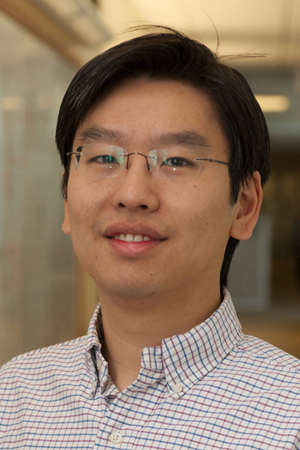News
Harris Wang Joins Columbia Initiative in Systems Biology
 Harris Wang has joined Columbia University Medical Center as an Assistant Professor in the Columbia Initiative in Systems Biology and the Department of Pathology and Cell Biology. His research focuses on understanding the evolution of the ecosystems that develop within heterogeneous microbial communities. Using approaches from genome engineering, DNA synthesis, and next-generation sequencing, he studies how genomes in microbial populations form, maintain themselves, and change over time, both within and across microbial communities. His goal is to use synthetic biology approaches to engineer ecologies of microbial populations, such as those found in the gut and elsewhere in the human body, in ways that could improve human health.
Harris Wang has joined Columbia University Medical Center as an Assistant Professor in the Columbia Initiative in Systems Biology and the Department of Pathology and Cell Biology. His research focuses on understanding the evolution of the ecosystems that develop within heterogeneous microbial communities. Using approaches from genome engineering, DNA synthesis, and next-generation sequencing, he studies how genomes in microbial populations form, maintain themselves, and change over time, both within and across microbial communities. His goal is to use synthetic biology approaches to engineer ecologies of microbial populations, such as those found in the gut and elsewhere in the human body, in ways that could improve human health.
Dr. Wang earned his BS in physics and applied mathematics at the Massachusetts Institute of Technology. He completed his PhD in biophysics at Harvard University, where, as a graduate student in George Church’s laboratory, he developed a technique called Multiplex Automated Genome Engineering (MAGE). This approach made it possible to produce synthetic organisms with novel properties, and to accelerate the process of directed evolution of gene networks and genomes. Most recently, he was a Wyss Technology Development Fellow and member of the Department of Systems Biology at Harvard University.
Dr. Wang has been recognized as a National Science Foundation Graduate Research Fellow, a National Defense Science and Engineering Graduate Fellow, Grand Prize winner in the 2009 Collegiate Inventors Competition, and a recipient of a National Institutes of Health Early Independence Award. Forbes magazine also named him among its “30 Under 30” in science.
To learn more about Dr. Wang (including opportunities for students and postdocs), visit his website, and see his recent paper in Molecular Systems Biology surveying new techniques for genome-scale engineering for systems and synthetic biology.